.jpg)
Toyota Yaris Cross Review
.jpg)
Introduction
Toyota’s Yaris has long been a favourite among small hatchback customers. But with the public going increasingly gaga for SUVs, Toyota has spun off the Yaris into this, the Yaris Cross. At its heart, it’s a Yaris on jacked up suspension, but in reality it’s a bit more than that. Raising the ride height brings it into competition with lots of other small SUVs, such as Hyundai Kona, Nissan Juke and Ford Puma. By only making the Yaris Cross with hybrid power, Toyota has created something that could be ideal for those that do most of the driving in town and want to keep fuel costs down. In this area of the market, making it a full-hybrid, rather than a more complicated and heavy plug-in hybrid, helps to keep monthly leasing costs low too.
Select's rating score* - 3.9 / 5
At a Glance
The Yaris Cross is a simple recipe, mixing a lofty ride height with a small footprint on your driveway and parking space. Mix in fuel-efficient hybrid power and plenty of boot space, and you’ve got a very attractive machine. It’s pretty decent to drive too, and with Toyota’s excellent reputation for reliability, you can be fairly confident that it won’t give you any trouble. There’s just one engine to choose from, but you can pick between two-wheel drive and four-wheel drive and (at the time of writing) five different trims to suit different budgets.
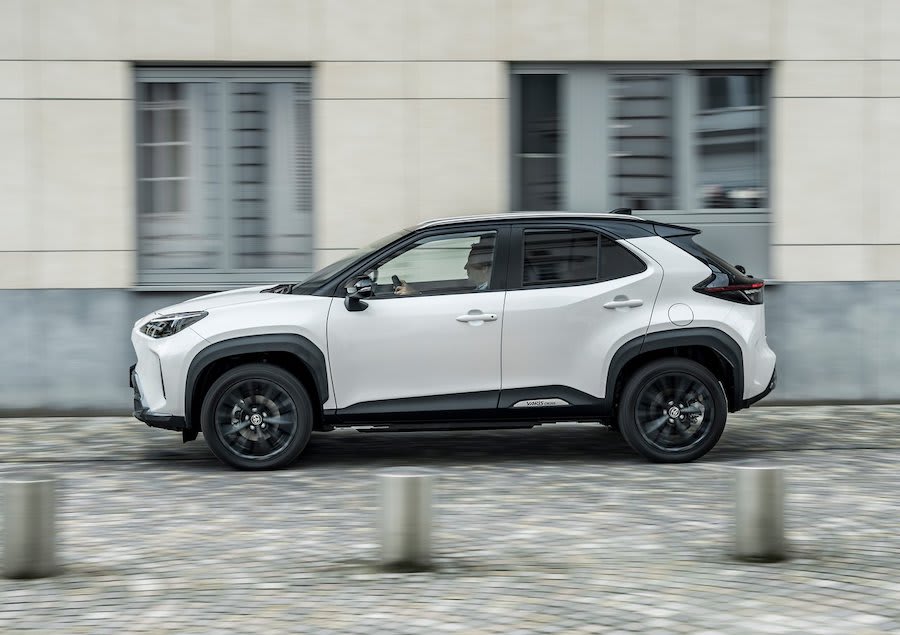
Key Features
The Yaris Cross’s selling points are its small hatchback-sized footprint and its high driving position, which gives you a commanding view of the road ahead. It’s slick to look at too, and can be combined with a number of eye-catching paint schemes. Plenty of trim choice means you can tailor your Yaris Cross to your preferred specification.
Unlike the regular Yaris hatchback however, there’s no choice in engines. All Yaris Crosses are full hybrids (or self-charging hybrids, as Toyota likes to call them). These aren’t the most efficient types of hybrid you can buy, but they will do small distances on electric power alone and can make a big dent on fuel bills, especially if you drive mostly around town, rather than on the motorway. The Yaris Cross also comes loaded with plenty of safety equipment and has a generous boot. And if you live in an area with lots of inclement weather, you may be tempted by the option of a four-wheel drive model.
Performance & Drive
The Yaris Cross is powered by a three-cylinder, 1.5-litre petrol engine, attached to an electric motor. Toyota has years of experience running this type of hybrid system, dating back to the early Prius, which became a byword for hybrid motoring. It’s a setup engineered primarily for efficiency, using a continuously variable transmission (CVT), rather than a regular automatic gearbox.
If you don’t know what this means, don’t worry; it basically means that it doesn’t use actual cogs in a gearbox, but can continually adjust itself to get the most out of the engine.
The power from the hybrid system is 114bhp, which is just about enough to give the little Yaris Cross some pep. It’s particularly effective around town, zipping up to speed quickly, responsive on the accelerator, and with no manual gearbox, it’s pretty effortless to drive.
The hybrid system will recoup energy into a battery when you brake or lift off the accelerator, and it can redeploy that as pure electric power for short bursts. The petrol engine seamlessly cuts in and out when needed, keeping your fuel use much lower than if you were using a regular petrol-only car.
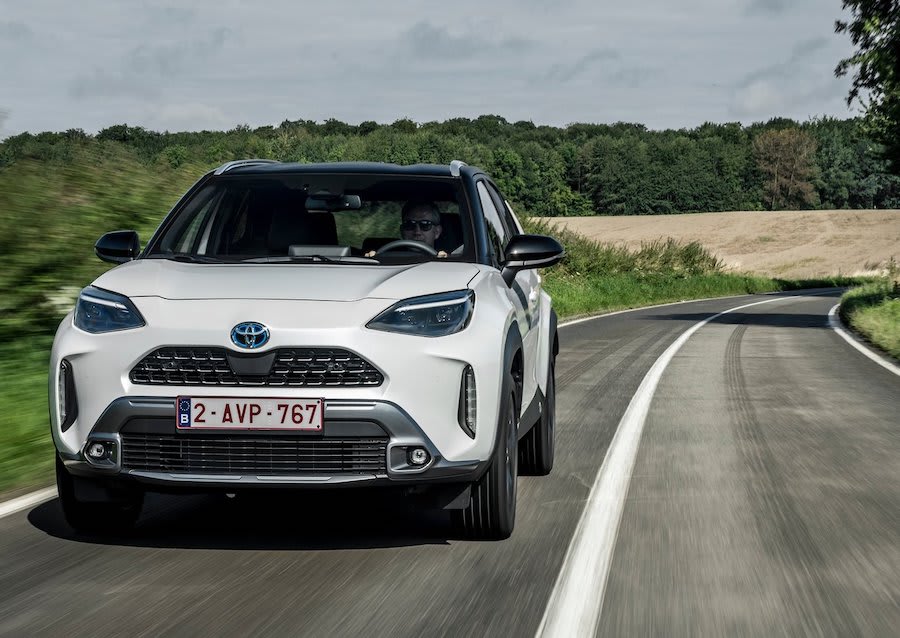
Downsides? Well, it can be a bit noisy if you accelerate hard, for example to get up to higher speeds on a motorway. And the way that the CVT works can be disconcerting too; under harder acceleration it sends the revs high and keeps them there, rather than stepping through gears.
Handling is very decent, striking a nice balance between comfort and a feeling of agility in the corners. It doesn’t feel as nimble as Ford’s Puma, which is still the go-to small SUV for enthusiasts, but it’s confident and composed through the bends. If you’re after the waftiest of rides then you might find the suspension a bit firm, but it’s still more than comfortable enough for everyday use.
While you can get a Yaris Cross with four-wheel drive, this isn’t an off-roader. It should be able to cope with muddy farm tracks, but not much more than that.
Running costs & Emissions
The Yaris Cross isn’t the cheapest small SUV to lease, but neither will it break the bank. At the time of writing, it cost more per month than a non-hybrid Nissan Juke, but less than a Hyundai Kona hybrid. And the hybrid bit is important, because that lowers your fuel costs against the opposition.
The sole hybrid power choice in the Yaris Cross means very reasonable running costs, especially if you do most of your driving around town, where the system is at its most effective. Official tests suggest you’ll get up to 52.7mpg out of the Yaris Cross, depending on spec, and our real-world experience suggests that’s pretty achievable.
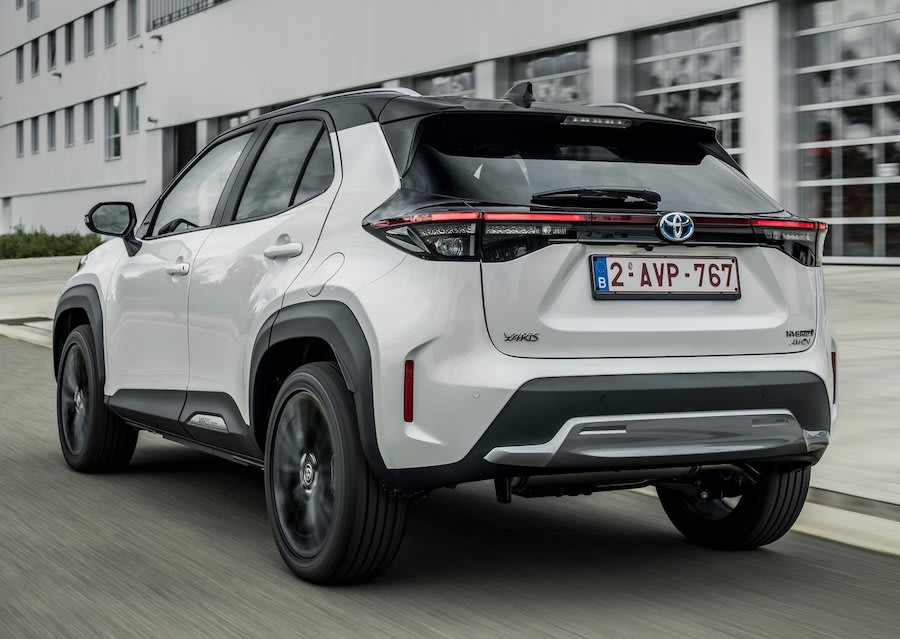
As the Yaris Cross isn’t a plug-in hybrid, it doesn’t qualify for preferential treatment on company car tax. However, carbon dioxide (CO2) emissions are relatively low, at between 102 and 117g/km, which means 24% to 27% benefit-in-kind tax bands for company car drivers (2021/22). You will get much cheaper company car tax on a PHEV or a full electric car, but they will cost more to lease.
Interior & Technology
The Yaris has a deliberately high driving position, aiming to emulate the commanding view of the road you get from larger SUVs. It feels taller than a lot of its rivals, and we’ll leave you to decide if that’s a positive or a negative.
Build quality is good, but the materials used don’t have the premium feel you get from some rivals. The Nissan Juke feels much more classy, but the Yaris Cross does feel solidly assembled.
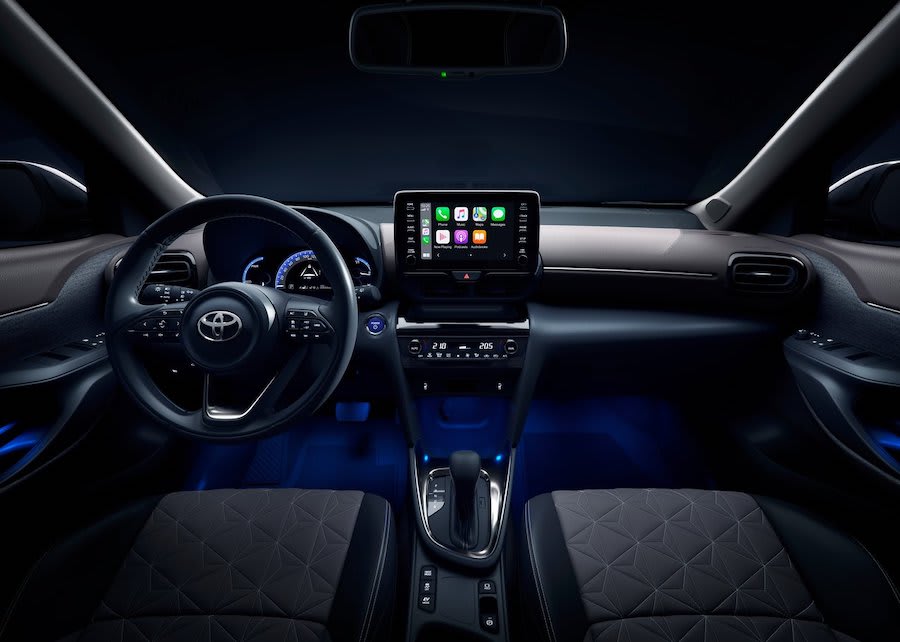
It can be a bit tricky to see out of the back, because the rising lower window line and bit rear pillars obstruct the view. But a rear-view camera is standard on every model, and most have parking sensors too, which makes manoeuvring a piece of cake.
There’s a touchscreen infotainment system on every car, with an 8.0-inch unit on the entry-level Icon and Design trims, and a 9.0-inch screen on the rest of the range, which also features sat-nav. The infotainment software isn’t one of the better systems on the market, unfortunately, feeling fairly old fashioned next to its rivals. It does have Apple CarPlay and Android Auto though, so you can just hook up your smartphone and use its apps through the touchscreen, rather than the proprietary Toyota features.
Practicality & Boot Space
The high ride height in the Yaris Cross is mirrored by a high roof, which means plenty of headspace inside for passengers, even in the rear. Leg space in the back is at more of a premium though, and if you’ve got tall people in the front seats, those behind them may be a bit squeezed. Although there are three seatbelts in the back, it’s more practical as a four-seater, as the middle seat is tiny, with even less legroom.
There’s much more space in the boot, however. There’s 400 litres of space to play with, which compares well to rivals like the Skoda Kamiq, although it’s smaller than the boot in the Puma. Impressively, the rear seats of the Yaris Cross fold down with a 20/40/20 split (apart from in the entry-level model.
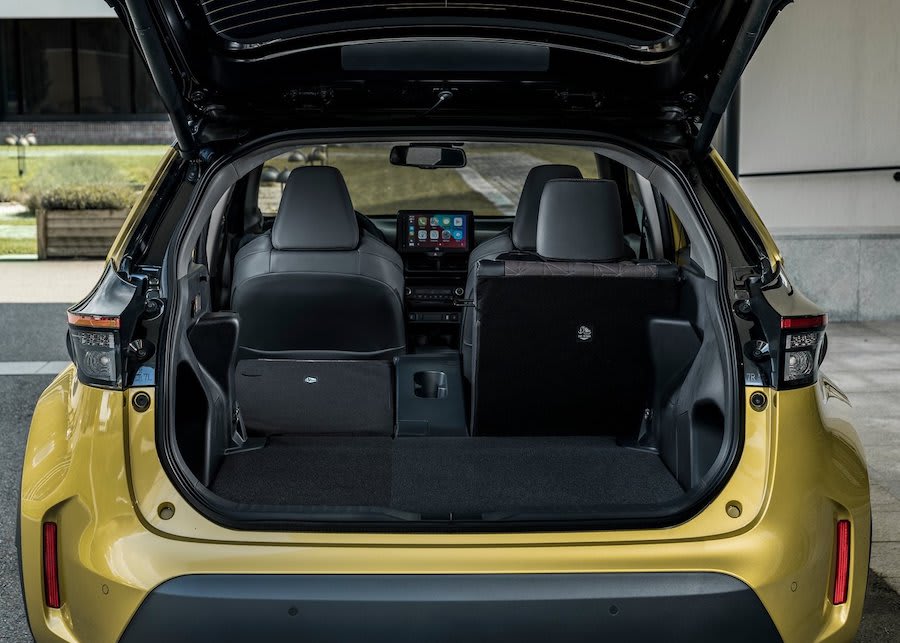
Most rivals only boast a 60/40 split, which means the Toyota has more flexibility when it comes to balancing passengers and luggage. A movable boot floor helps make loading larger items easier, as if you move it to its highest position it eliminates the lip between floor and boot aperture.
General storage is reasonable, with a space in front of the gear lever and a tray under the infotainment screen, as well as two cup holders between the front seats and two more in the back (apart from in the entry-level model). The door pockets are quite small, however.
Safety
The Yaris Cross hasn’t been tested by independent safety organisation Euro NCAP, but the latest Yaris hatchback has, and scored the maximum five stars. Toyota includes a generous amount of safety features on every model, including automatic emergency braking, which will intervene if you don’t respond to an impending collision. Lane keep assist is also standard, helping prevent you from inadvertently leaving your lane. Optional systems include a blind-spot monitoring system and rear cross-traffic alert, which warns you of oncoming vehicles when reversing out of a parking space.
All models have Isofix child seat mounting points on the outer rear seats, and front, side and central airbags.
Options
There are five trims to choose from. The entry-level car is the Icon, but it’s far from spartan in terms of features. It rides on 16-inch alloy wheels and has halogen headlights, as well as the 8.0-inch infotainment system with Apple CarPlay and Android Auto. Smart entry and a push-button start are included, as is adaptive cruise control and a reversing camera.
Next up is the Design, which has bigger 17-inch alloys, the 20/40/20 split folding rear seats and brighter LED headlights. Upgrade to Excel and you’ll get 18-inch dark-grey wheels, an electric boot lid, the upgraded infotainment system and the extra safety systems mentioned above, as well as synthetic leather upholstery and front and rear parking sensors. The Dynamic model is similarly equipped as the Excel, but with a black bitone roof and a sportier look.
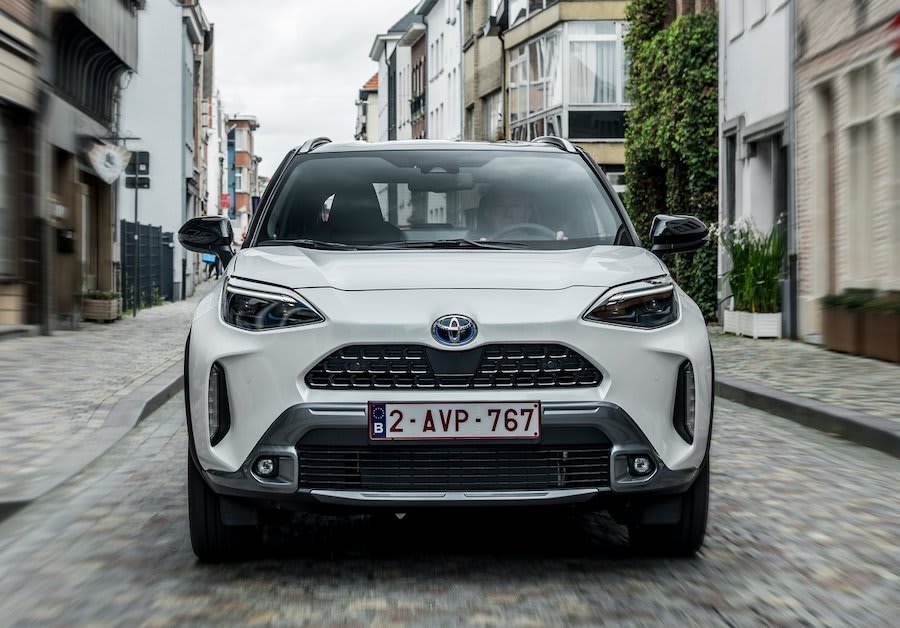
At the top of the range is the Premiere Edition, although this is likely to be a limited run model to celebrate the car’s launch. It comes with a head-up display, which projects driving information onto the windscreen, and an upgraded JBL sound system.
Options include a range of colours, including bi-tone schemes that have a black roof. There are a range of alloy wheels to choose from, and various upholstery colours too, including leather and synthetic leather.
In addition, there are various option packs you can pick. The SUV pack adds protective features like rubber floor mats, mud flaps and side steps, while the Essential Protection Pack has a boot liner. The Sports Pack adds silver touches to the exterior, including a front and rear skirt.

Rival Cars
There’s no shortage of competition for the Yaris Cross, as the small SUV market is extremely popular; just about every major manufacturer has a product to offer. The Yaris Cross deserves to do well though; its name gives it instant recognisability, thanks to the success of its hatchback namesake, while the hybrid powertrain and the option of four-wheel drive make it stand out.
If you’re interested in it though, there are several top rivals we’d recommend you check out. The Ford Puma is one of the very best cars of this type; it’s great to drive and practical, but doesn’t have the Yaris Cross’s hybrid fuel efficiency. Skoda’s Kamiq is also worth a look, with some great features, a comfortable drive and a more premium feel than the Toyota. Nissan’s Juke has a classy interior too, and eye-catching looks, and the Renault Captur E-Tech offers a plug-in hybrid alternative that could make for great fuel savings. Check out Hyundai’s Kona Hybrid too, and if you want an all-electric option, the Kona Electric could be for you.
Verdict & Next Steps
The Yaris Cross is a latecomer to a very competitive small SUV market, but it’s got plenty of features that should serve it well. Smart looks, a recognisable name and established hybrid credibility mix with a solid driving experience, decent practicality and lots of equipment across a wide range of trims. Then there’s Toyota’s tremendous reputation for reliability, and some very reasonable monthly leasing costs. If you want something sharp to drive then there are better options, most notably Ford’s Puma, and there are plug-in hybrid and electric alternatives too, but the Yaris Cross is a very solid all-rounder, and should definitely be on your list of small SUVs to check out.
Where to next?
View latest Toyota Yaris Cross leasing deals - from just £217.89 per month inc VAT**
Looking for a great leasing deal? Check out our incredible range of car lease deals
New SUV? Read our latest Car Reviews and find the right model for you
Want to know more about leasing? Take a look at our comprehensive Leasing Guides
Interested in everything motoring? Why not catch up on all the latest Car Leasing News.
**Score based on Select’s unique meta score analysis, taking into account the UK’s top five leading independent car website reviews of the Toyota Yaris Cross
**Correct as of 19/10/2021. Based on 9 months initial payment, 5,000 miles over a 48 month lease. Initial payment equivalent to 9 monthly payments or £1961.01 Ts and Cs apply. Credit is subject to status.





















